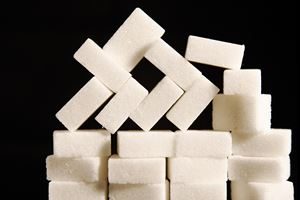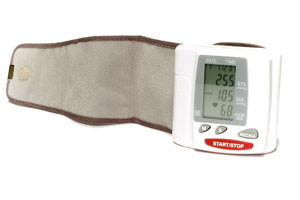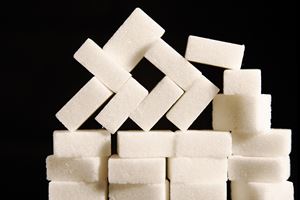Dutch Apple Cake Recipe – No Refined Sugar!

As we mentioned in Wednesday’s post, we are going to be sharing
recipes that taste great but don’t have refined sugar. Here’s a link
to a great recipe! Lots of yumminess and no refined sugar!:

As we mentioned in Wednesday’s post, we are going to be sharing
recipes that taste great but don’t have refined sugar. Here’s a link
to a great recipe! Lots of yumminess and no refined sugar!:

Sugar is in almost everything we eat. In the typical western diet, enough sugar has been added to food products to bring our consumption of the sweet stuff up to 22.7 teaspoons per day. It is added to processed foods to extend shelf life and enhance flavor and texture. While we know that sugar contributes to weight gain, diabetes and heart disease, it’s still hard to resist. Why? Much of the answer to that question has to do with the way humans have evolved to survive in times of scarcity.
Our ancestors who had developed a taste for sugar were able to add to their body fat, which helped to keep them alive during periods of famine. This in turn allowed them to pass their sweet-loving genes on to their progeny. A study conducted by researchers at Washington University found that we are programmed from birth to crave sweet things. Human breast milk is very sweet due to the concentration of the sugar lactose, so from day one we learn to develop a sweet tooth.
One study showed how even the mere expectation of sugar can affect our cognitive ability. Scientists found that when study subjects swished sugar water around in their mouths and then spit it out, they performed better on cognitive tests than the subjects who had swished water that had been artificially sweetened. And there is a good reason why sugar is addictive. Eating sugar prompts the release of the hormone serotonin from the same area of the brain that responds to heroin and cocaine, inducing a feeling of happiness and euphoria.
It’s not always obvious where sugar is hiding in the foods we eat. While our consumption of table sugar is down, the amount added to processed foods is increasing. Many people are surprised to find how much sugar is added to such things as bologna (1.18 tsp. per 4 slices), ketchup (1.77 tsp. per 3 tbsp.) and low-fat fruit yogurt (6.16 tsp.). A couple of spoons of barbecue sauce have about as much sugar as a glazed donut! Add in the sugars typically contained in soups, sauces and breads, and it’s easy to see why obesity is becoming such an epidemic. The more we get, the more we want. A sudden rush of sugar spurs the release of insulin, which causes the infamous “sugar crash” and makes us crave even more to combat it.
However, it is possible to overcome an addiction to sugar, just as it’s possible to overcome an addiction to any other substance. Gradually use less where you can, such as in coffee or tea and in your breakfast cereal. You can also reduce or eliminate your consumption of soda (including artificially sweetened soda, which still makes you crave the sweet taste) and water down any fruit juices you may drink. After a while, your body does adjust to the taste. After a few months, if you suddenly are given coffee with sugar in it, you may find it tastes odd. Try to avoid buying store-bought desserts, and if you make your own, reduce the amount of sugar called for in the recipe. Many baked goods can use unsweetened applesauce as a substitute for 2/3 of the sugar required.
Our society has made it difficult to resist sugar, but it’s not impossible, and the less sugar you eat, the better it will be for your overall health.
At Oblander Chiropractic, we are working hard to help our patients live lives of health and wellness. As a part of that effort, we are going to be sharing recipes that replace refined sugar with natural sugars. Be sure to watch our posts for those recipes!

High blood pressure (hypertension) often has no visible symptoms, especially early on. The only way to determine your blood pressure is to have it measured. If you have high blood pressure, lowering it is vitally important to your long-term health and to reducing your risk of cardiovascular disease.
Risk factors for high blood pressure include the following:
While you cannot influence some of these factors (such as genetic disposition and aging), it is possible to manage most of the items on this list.
Exercise is one very effective way to reduce high blood pressure. First of all, it increases your general level of activity. Second, it tends to lower your weight. And third, it helps to reduce stress because of the release of endorphins. Yoga and biofeedback have also been found to be beneficial in reducing stress.
When it comes to diet and blood pressure, bananas can be a useful addition. Bananas are a rich source of potassium and can help normalize the potassium-sodium balance in your cells. Limiting the sodium content of your food is also important. Eliminate refined sugar from your diet. Relying on fruit and natural 100% fruit juices to sweeten your diet can be one of the best things you can do.
Alcohol, like most everything else, should be taken in moderation. If you have too much stress in your life, realize that alcohol is a depressant and cannot help in the long run. Exercise is a much better stress reliever.
A few herbs are believed to contribute to high blood pressure risk:
Calcium and magnesium have been found to improve blood pressure. In particular, they’re associated with improving nerve action, calming nervous tension and reducing jitters.
These substances also help reducing high blood pressure or its risk:
If you have high blood pressure, be sure to consult with your doctor before following any of the above suggestions. But rest assured that there are natural ways for you to manage your blood pressure without resorting to drugs.

Sugar is in almost everything we eat. In the typical western diet, enough sugar has been added to food products to bring our consumption of the sweet stuff up to 22.7 teaspoons per day. It is added to processed foods to extend shelf life and enhance flavor and texture. While we know that sugar contributes to weight gain, diabetes and heart disease, it’s still hard to resist. Why? Much of the answer to that question has to do with the way humans have evolved to survive in times of scarcity.
Our ancestors who had developed a taste for sugar were able to add to their body fat, which helped to keep them alive during periods of famine. This in turn allowed them to pass their sweet-loving genes on to their progeny. A study conducted by researchers at Washington University found that we are programmed from birth to crave sweet things. Human breast milk is very sweet due to the concentration of the sugar lactose, so from day one we learn to develop a sweet tooth.
One study showed how even the mere expectation of sugar can affect our cognitive ability. Scientists found that when study subjects swished sugar water around in their mouths and then spit it out, they performed better on cognitive tests than the subjects who had swished water that had been artificially sweetened. And there is a good reason why sugar is addictive. Eating sugar prompts the release of the hormone serotonin from the same area of the brain that responds to heroin and cocaine, inducing a feeling of happiness and euphoria.
It’s not always obvious where sugar is hiding in the foods we eat. While our consumption of table sugar is down, the amount added to processed foods is increasing. Many people are surprised to find how much sugar is added to such things as bologna (1.18 tsp. per 4 slices), ketchup (1.77 tsp. per 3 tbsp.) and low-fat fruit yogurt (6.16 tsp.). A couple of spoons of barbecue sauce have about as much sugar as a glazed donut! Add in the sugars typically contained in soups, sauces and breads, and it’s easy to see why obesity is becoming such an epidemic. The more we get, the more we want. A sudden rush of sugar spurs the release of insulin, which causes the infamous “sugar crash” and makes us crave even more to combat it.
However, it is possible to overcome an addiction to sugar, just as it’s possible to overcome an addiction to any other substance. Gradually use less where you can, such as in coffee or tea and in your breakfast cereal. You can also reduce or eliminate your consumption of soda (including artificially sweetened soda, which still makes you crave the sweet taste) and water down any fruit juices you may drink. After a while, your body does adjust to the taste. After a few months, if you suddenly are given coffee with sugar in it, you may find it tastes odd. Try to avoid buying store-bought desserts, and if you make your own, reduce the amount of sugar called for in the recipe. Many baked goods can use unsweetened applesauce as a substitute for 2/3 of the sugar required.
Our society has made it difficult to resist sugar, but it’s not impossible, and the less sugar you eat, the better it will be for your overall health.
 Sugar is in almost everything we eat. In the typical western diet, enough sugar has been added to food products to bring our consumption of the sweet stuff up to 22.7 teaspoons per day. It is added to processed foods to extend shelf life and enhance flavor and texture. While we know that sugar contributes to weight gain, diabetes and heart disease, it’s still hard to resist. Why? Much of the answer to that question has to do with the way humans have evolved to survive in times of scarcity.
Sugar is in almost everything we eat. In the typical western diet, enough sugar has been added to food products to bring our consumption of the sweet stuff up to 22.7 teaspoons per day. It is added to processed foods to extend shelf life and enhance flavor and texture. While we know that sugar contributes to weight gain, diabetes and heart disease, it’s still hard to resist. Why? Much of the answer to that question has to do with the way humans have evolved to survive in times of scarcity.
Our ancestors who had developed a taste for sugar were able to add to their body fat, which helped to keep them alive during periods of famine. This in turn allowed them to pass their sweet-loving genes on to their progeny. A study conducted by researchers at Washington University found that we are programmed from birth to crave sweet things. Human breast milk is very sweet due to the concentration of the sugar lactose, so from day one we learn to develop a sweet tooth.
One study showed how even the mere expectation of sugar can affect our cognitive ability. Scientists found that when study subjects swished sugar water around in their mouths and then spit it out, they performed better on cognitive tests than the subjects who had swished water that had been artificially sweetened. And there is a good reason why sugar is addictive. Eating sugar prompts the release of the hormone serotonin from the same area of the brain that responds to heroin and cocaine, inducing a feeling of happiness and euphoria.
It’s not always obvious where sugar is hiding in the foods we eat. While our consumption of table sugar is down, the amount added to processed foods is increasing. Many people are surprised to find how much sugar is added to such things as bologna (1.18 tsp. per 4 slices), ketchup (1.77 tsp. per 3 tbsp.) and low-fat fruit yogurt (6.16 tsp.). A couple of spoons of barbecue sauce have about as much sugar as a glazed donut! Add in the sugars typically contained in soups, sauces and breads, and it’s easy to see why obesity is becoming such an epidemic. The more we get, the more we want. A sudden rush of sugar spurs the release of insulin, which causes the infamous “sugar crash” and makes us crave even more to combat it.
However, it is possible to overcome an addiction to sugar, just as it’s possible to overcome an addiction to any other substance. Gradually use less where you can, such as in coffee or tea and in your breakfast cereal. You can also reduce or eliminate your consumption of soda (including artificially sweetened soda, which still makes you crave the sweet taste) and water down any fruit juices you may drink. After a while, your body does adjust to the taste. After a few months, if you suddenly are given coffee with sugar in it, you may find it tastes odd. Try to avoid buying store-bought desserts, and if you make your own, reduce the amount of sugar called for in the recipe. Many baked goods can use unsweetened applesauce as a substitute for 2/3 of the sugar required.
Our society has made it difficult to resist sugar, but it’s not impossible, and the less sugar you eat, the better it will be for your overall health.